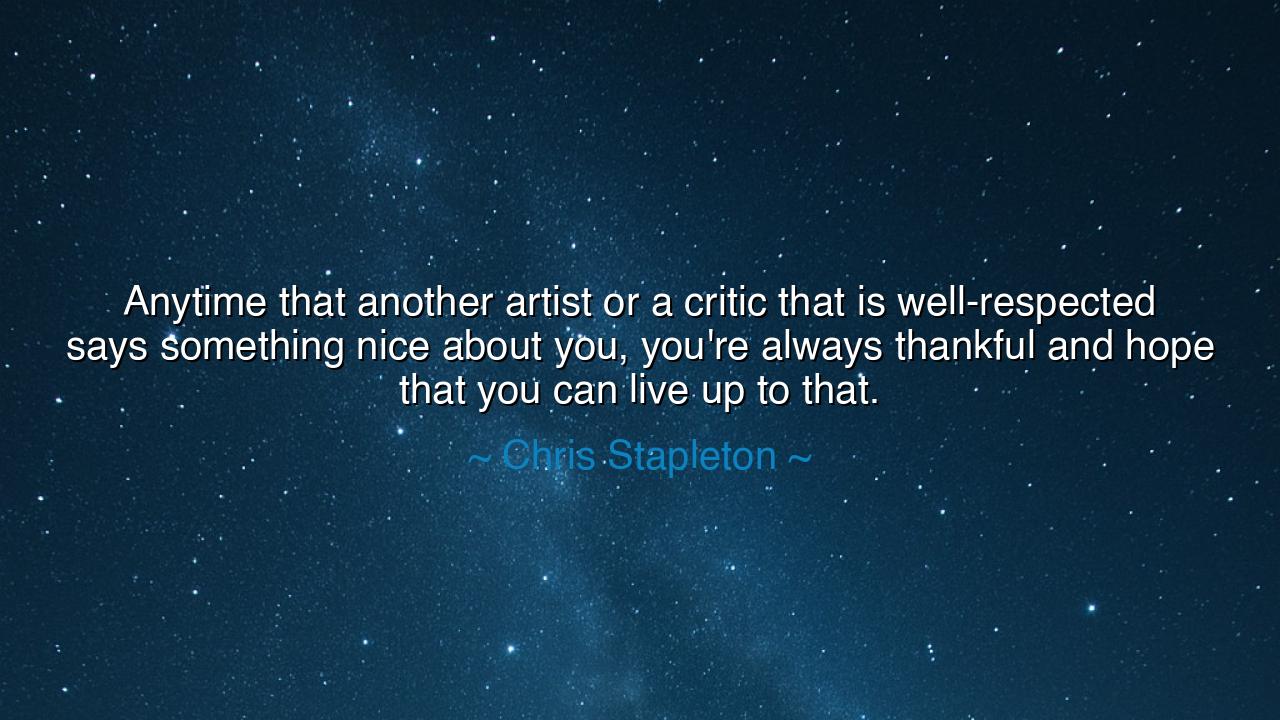
Anytime that another artist or a critic that is well-respected
Anytime that another artist or a critic that is well-respected says something nice about you, you're always thankful and hope that you can live up to that.






In the words of Chris Stapleton, there is humility and awareness of the weight of praise: “Anytime that another artist or a critic that is well-respected says something nice about you, you’re always thankful and hope that you can live up to that.” These are not the words of pride, but of reverence for recognition and responsibility. For when praise comes from those who have walked the path before us, it is not merely flattery—it is a charge, a reminder that we must carry ourselves in such a way that honors their trust.
The meaning of his words lies in the dual nature of recognition. On the one hand, it is a gift, for it affirms one’s labor and validates the long nights, the sacrifices, and the relentless pursuit of craft. On the other, it is a burden, for to be praised is to be held to a higher standard, to live with the weight of expectation. Stapleton acknowledges this tension and embraces it not with arrogance, but with thankfulness—a heart willing to receive praise with humility rather than entitlement.
History offers us powerful illustrations of this truth. Consider Alexander the Great, praised from his youth by Aristotle as a mind destined for greatness. Those words of admiration were not only affirmation but also a standard to which Alexander strove to rise. His victories across the known world were fueled not just by ambition, but also by the weight of expectation carried in the praises of his teacher and companions. In the same way, an artist today, receiving recognition from peers and critics, feels compelled to live up to the honor bestowed upon them.
Stapleton’s wisdom also reveals the importance of respect in praise. Praise from the careless or insincere is empty, but when it comes from the respected—from those who themselves have earned the right to speak—it becomes a treasure. It is as if a master craftsman tells the apprentice, “You are worthy,” or as if a veteran soldier places a hand upon the shoulder of the young warrior. Such words carry authority, and to receive them is to be both lifted and tested.
The presence of thankfulness in his statement is critical. Without gratitude, praise easily becomes poison, inflating pride and corrupting the heart. But with gratitude, praise becomes nourishment—an encouragement to keep striving, to remain humble, and to continue refining one’s craft. Stapleton’s acknowledgment that he “hopes to live up to it” shows a spirit not satisfied with arrival, but always pressing forward toward excellence.
The lesson for us is profound: when we are praised, we must meet it with humility, gratitude, and renewed commitment. Recognition is not the end of the road but a signpost, reminding us that others are watching, hoping, and believing in us. To honor that belief is to transform praise into fuel for further growth, rather than a crown of idleness.
Practically, this means embracing praise not as entitlement, but as encouragement. When someone respected honors your work, say thank you—and then work harder still, not out of fear, but out of respect for their faith in you. Likewise, be generous in offering genuine praise to others, for you may be planting within them the fire that keeps them striving.
Thus, the wisdom of Chris Stapleton stands clear: to receive praise is to receive both blessing and responsibility. To be thankful is the key, and to hope to live up to it is the path of the honorable. May we learn to carry recognition as a mantle of duty, to let it sharpen us rather than soften us, and to live in such a way that the words spoken about us prove true in the fullness of time.






AAdministratorAdministrator
Welcome, honored guests. Please leave a comment, we will respond soon